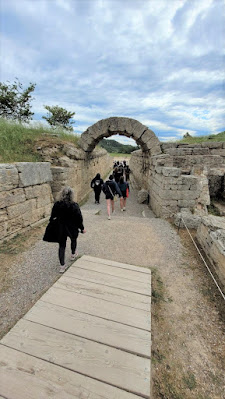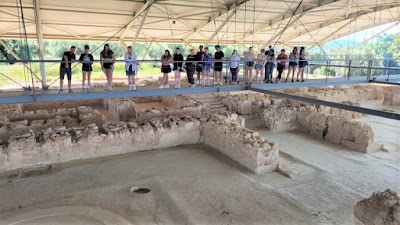Official CIG Inauguration. With Eleftherios Anghelopoulos, former Greek Ambassador to Canada & Robert Peck, former Canadian Ambassador to Greece and CIG Board member
My name is Ioannis Dedes. I am a second-year undergraduate student at McGill, majoring in Political Science and History, and I plan to continue my studies in ancient political philosophy and theory.
This summer, I had the excellent opportunity to be a summer intern at the Canadian Institute in Greece. It was a fantastic experience that I would highly recommend to anyone interested in archaeology, history, or just getting out of their comfort zone and doing something different.
The people at the Institute were all very welcoming and made it easy to feel like part of the team right away. It was also nice that there was such a variety of tasks available: if you wanted something challenging, you could work on something that would stretch your skills; if you wanted something less intense, there were plenty of opportunities.
What made it all worth it was being surrounded by such a diverse group of people. Everyone was committed to making sure that we could accomplish our goals and have fun doing it, which made the whole thing feel like more than just work.
Lecture Reception. With Dr. Jonathan E. Tomlinson, CIG Assistant Director, and fellow CIG interns
Work & Skill Development at CIG
The Canadian Institute in Greece (CIG) is a privately-funded, not-for-profit organization incorporated in Canada. CIG was founded in 1974 and has sought to promote Canadian research and education in fields relating to Greece’s heritage ever since. I chose this organization because I find its mission in the area of history and political analysis to be vital.
I worked on various projects, including researching multiple topics, updating and writing on the Institute's website and social media accounts, and contributing to the organization of events. The work was challenging but rewarding, and I learned so much about the entire world of research and public relations. The best part about my internship was that it allowed me to be exposed to so many different approaches to my field of studies, politics, while also allowing me to meet people from all over the political and diplomatic world.
During my internship experience with CIG, I have developed my time management and leadership skills. Multiple times, I was called to contribute to the organization of seminars and lectures, as well as the online advertising agenda of the Institute. I learned how to communicate effectively with other people, whether they were inside or outside of my organization. My communication skills were improved because of this experience, as well as my ability to problem solve.
Official CIG Inauguration. With Steve Mirkopoulos, brother of the late Nick Mirkopoulos, in whose memory the Institute's premises are named
My Field of Studies: Politics & CIG
Another significant reason I wanted to do the internship is to learn more and excel in the area of political theory combined with its roots in the ancient Greek world. I have always been interested in this interdisciplinary approach to political science and history, so I thought this would be an excellent opportunity to learn more about how it works in practice and research while adding exciting parameters such as archaeology and economics to the equation.
Through my undergraduate studies and extracurricular writing portfolio, I’ve made great efforts to link my political theory and philosophical interest with the world of ancient Greece and historically relevant aspects of archaeological heritage. My research focuses on a combination of the ancient Greek world with the political theory developed at that time, and archaeology is vital to this approach.
My specific role at the Canadian Institute in Greece was to complete extensive research, attend multiple lectures and programs as well as study the archaeological excavations of the Institute and Ancient Athens in general. As far as my purpose is concerned, I was more than happy to have access to such a library and resources. I am finishing my first book about the Greek War of Independence and the development of the Greek state, so the resources at the CIG were more than valuable.
During the second month of my internship, the CIG helped me meet
researchers and university teachers who were hosting history programs,
combining political theory and lectures in places such as the Greek
Parliament. By attending the meetings and seminars, I handled the
challenge of achieving the interdisciplinary approach between history,
archaeology, and politics.
Official CIG Inauguration. With Mark Allen, Ambassador to Greece and High Commissioner for Cyprus (left) & Julius Makos, fellow CIG intern (right)
Highlights of the CIG Internship
The Canadian Institute in Greece hosted great programs that combined history with politics. One of the main highlights of my experience was all the interesting individuals I met during my two months at the Institute. At the official Inauguration, I got the opportunity to connect with researchers, teachers, and even political figures directly involved in the Greek-Canadian political stage.
Each one gave me a unique perspective on politics, and I had the chance to learn about their experiences and how they got into politics. In addition to learning about individual politicians, though, I also received insight from the professionals about how politics is an academic field that combines history with other disciplines like economics and sociology.
Another major highlight has been my experience in the city of Athens as a researcher and an intern. From the standpoint of learning outcomes, research has helped me gain valuable information on the role of archaeological excavations and their connection to relevant historical events. Although I grew up in Athens, the most vital learning outcome was achieved by visiting the Ancient Athenian sites and monuments as a researcher and not just as a visitor. Now, I had a purpose and a mission of analysing the foundational role of Athens in today’s political structure and democracy.
Official CIG Inauguration. With Zoe Delibasis, CIG Cultural Program Manager (left), Prof. Jacques Y. Perreault, CIG Director (right) & Julius Makos, fellow CIG intern (right)
CIG Internship Challenges
The honour and the satisfaction from such opportunities were met with the challenges of connecting all the historical and archaeological research to my specific field of politics and philosophical theory studies. After having access to such a vast array of bibliography, resources, and opportunities, I realized that narrowing down my research topic while also finding the right detailed approach would be more of an issue than I had expected.
The opportunity to meet significant individuals from the political or diplomatic stage was also a challenge. I did this for the first time at the professional level and had to overcome certain anxiety-driven emotions. Additionally, it was the first time I was called to have meetings with esteemed individuals and researchers who were willing to help me with my research but, at the same time, intended to have a fruitful conversation.
Regarding the organization and the logistical approach, the CIG lectures, events, and openings weren’t new to me in terms of the tasks that had to be performed, but the challenge was the size of the institute’s events. Whereas in previous internships, I had to organize events for 25-50 people, everything had to be perfect for 80-100 guests.
Concluding Remarks
Overall, the summer internship program at CIG provided me with the opportunity to reap a multitude of benefits and learn new skills. My experience exposed me to environments quite different from my own and taught me how people make administrative decisions in such an institution.
This summer at the Institute allowed me to apply some of my academic training in a real-world context. The CIG experience allowed me to effectively utilise the skills I have developed throughout my academic and writing career and will undoubtedly assist me in future endeavors.
Special thanks to:
- CIG Cultural Program Manager and my internship supervisor, Zoe Delibasis.
- CIG Assistant Director, Dr. Jonathan E. Tomlinson
- CIG Director, Professor Jacques Y. Perreault
- CIG Colleague and Good Friend, Julius Makos
Ioannis Dedes, McGill University Intern, Summer 2022












